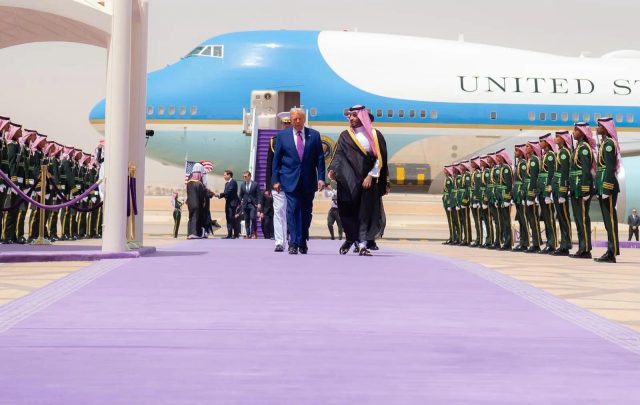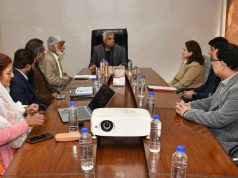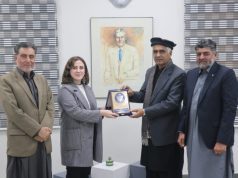RIYADH, Tuesday, May 13, 2025 (WNP): U.S. President Donald J. Trump arrived in Riyadh on Tuesday for a high-profile state visit to the Kingdom of Saudi Arabia, marking a major diplomatic engagement aimed at deepening long-standing strategic, economic, and technological partnerships between the two nations.
President Trump was warmly received at King Khalid International Airport by His Royal Highness Crown Prince and Prime Minister Mohammed bin Salman, who led the official welcome alongside a delegation of senior Saudi officials including Deputy Governor of Riyadh Prince Mohammed bin Abdulrahman, Saudi Ambassador to the U.S. Princess Reema bint Bandar, Riyadh Mayor Prince Faisal bin Abdulaziz bin Ayyaf, and PIF Governor Yasir Al-Rumayyan. The arrival ceremony featured a 21-gun salute and trumpet fanfare, underscoring the visit’s significance.
Later, the Crown Prince hosted President Trump at Al-Yamamah Palace, where an official reception included an Arabian horse escort and the playing of both national anthems. The leaders held a cordial meeting over traditional Saudi coffee before proceeding to a formal luncheon in the president’s honor.
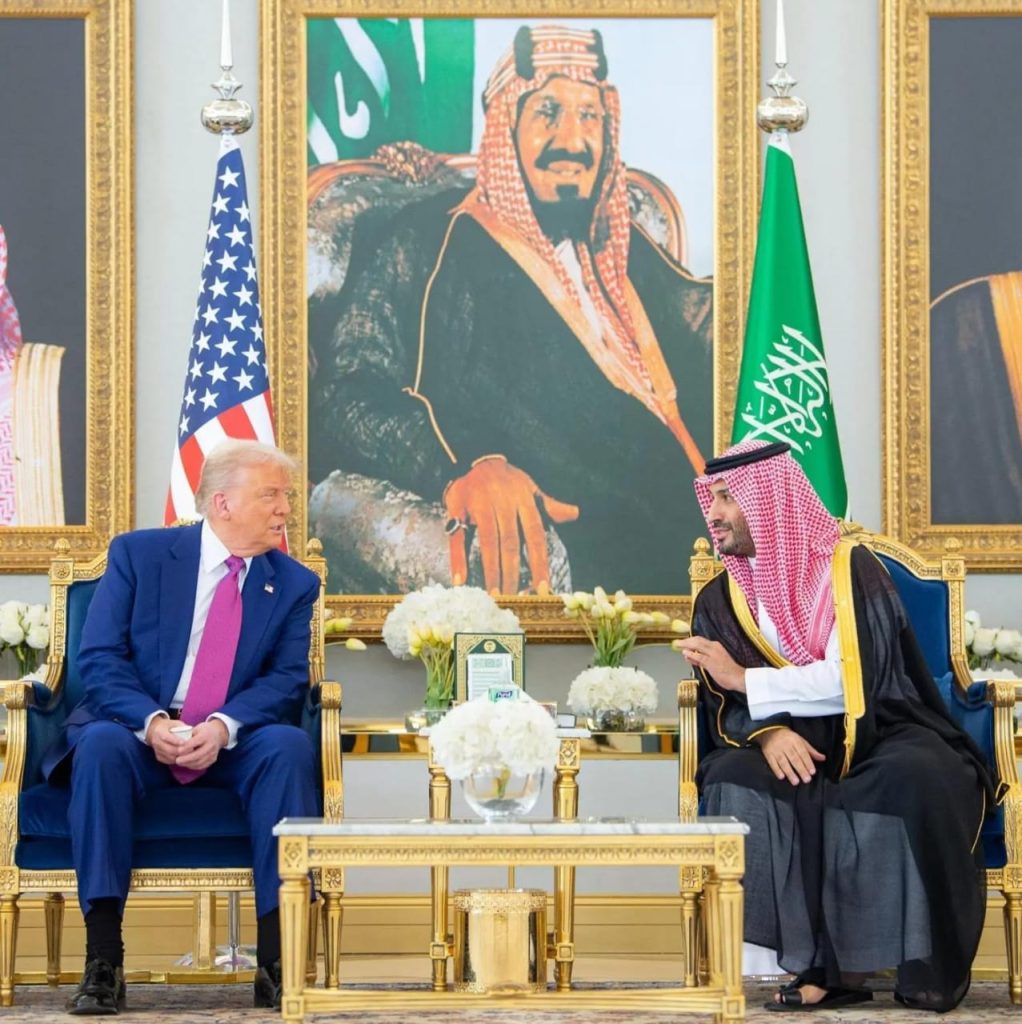
Saudi-US investment forum unveiled
Coinciding with the presidential visit, the 2025 Saudi-US Investment Forum opened at the King Abdulaziz International Conference Center, drawing participation from high-level officials and business leaders from both countries. Saudi Minister of Investment Khalid Al-Falih delivered the keynote address, highlighting more than 90 years of bilateral relations rooted in trust, partnership, and shared economic goals.
Al-Falih presented the 2024 annual report on Vision 2030, showcasing Saudi Arabia’s economic diversification efforts and the opening of new investment avenues in sectors such as renewable energy, AI, biotechnology, tourism, healthcare, logistics, and advanced technologies. He stressed the importance of resilient, forward-looking economic partnerships to navigate global challenges and capitalize on transformative opportunities.
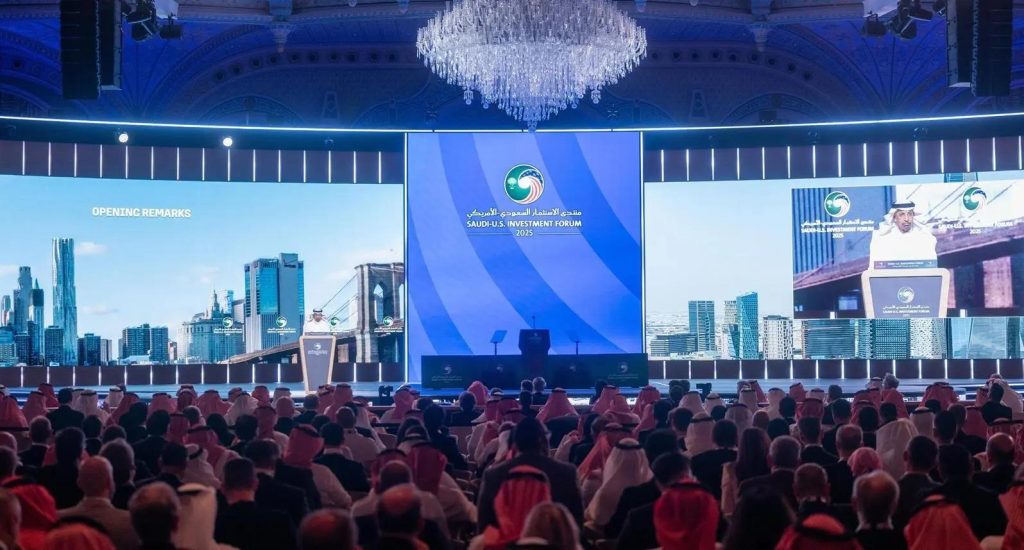
Saudi-US Summit yields major strategic, economic & defense agreements
His Royal Highness Prince Mohammed bin Salman bin Abdulaziz Al Saud, Crown Prince and Prime Minister of the Kingdom of Saudi Arabia, and U.S. President Donald J. Trump co-chaired the Saudi-U.S. Summit at the Royal Court in Al-Yamamah Palace.
The high-level summit underscored the strength of the bilateral relationship, focusing on deepening the strategic partnership between the two nations. Talks covered a broad spectrum of sectors and included discussions on regional and international developments, with both leaders reaffirming their commitment to enhancing cooperation on security, stability, and shared interests.
A key highlight of the summit was the signing of the Strategic Economic Partnership Agreement, aimed at advancing long-term economic collaboration between Saudi Arabia and the United States.
The leaders also witnessed the signing and announcement of several pivotal agreements and memoranda of understanding (MoUs) across defense, energy, health, space, and cultural sectors, including:
Energy Cooperation MoU: Signed between Saudi Arabia’s Ministry of Energy and the U.S. Department of Energy, exchanged by Saudi Energy Minister Prince Abdulaziz bin Salman and U.S. Energy Secretary Chris Wright.
Defense Modernization Intent: A memorandum aimed at upgrading the Saudi Armed Forces’ future defense capabilities, exchanged by Saudi Defense Minister Prince Khalid bin Salman and U.S. Secretary of Defense Pete Hegseth.
Additional agreements announced include:
Mining and Minerals Cooperation between the Saudi Ministry of Industry and Mineral Resources and the U.S. Department of Energy.
Defense Logistics and Training Letter of Intent, covering ammunition, maintenance, education, and system modernization for the Ministry of National Guard.
MoU between Saudi Interior Ministry’s International Partnership Program and the U.S. FBI to bolster security cooperation.
Health Capability Development agreement between Saudi Arabia’s Ministry of Defense and the U.S. Department of Defense.
Judicial Cooperation MoU between the Saudi and U.S. Ministries of Justice.
Space Collaboration Agreement between the Saudi Space Agency and NASA on the Artemis II Space Weather CubeSat mission.
Customs Mutual Assistance Agreement enhancing trade and border security collaboration.
Amended Air Transport Protocol, updating the bilateral aviation framework.
Medical Research Collaboration MoU between the Saudi National Institute of Health Research and the U.S. National Institute of Allergy and Infectious Diseases.
Cultural and Scientific Collaboration Agreements between the Royal Commission for AlUla and the Smithsonian Institution, including partnerships with the National Zoo and Conservation Biology Institute and the National Museum of Asian Art.
Following the summit and official proceedings, President Trump departed Al-Yamamah Palace and was formally seen off by Crown Prince Mohammed bin Salman.
The summit marks a significant milestone in U.S.-Saudi relations, reinforcing a shared commitment to long-term cooperation across key domains.
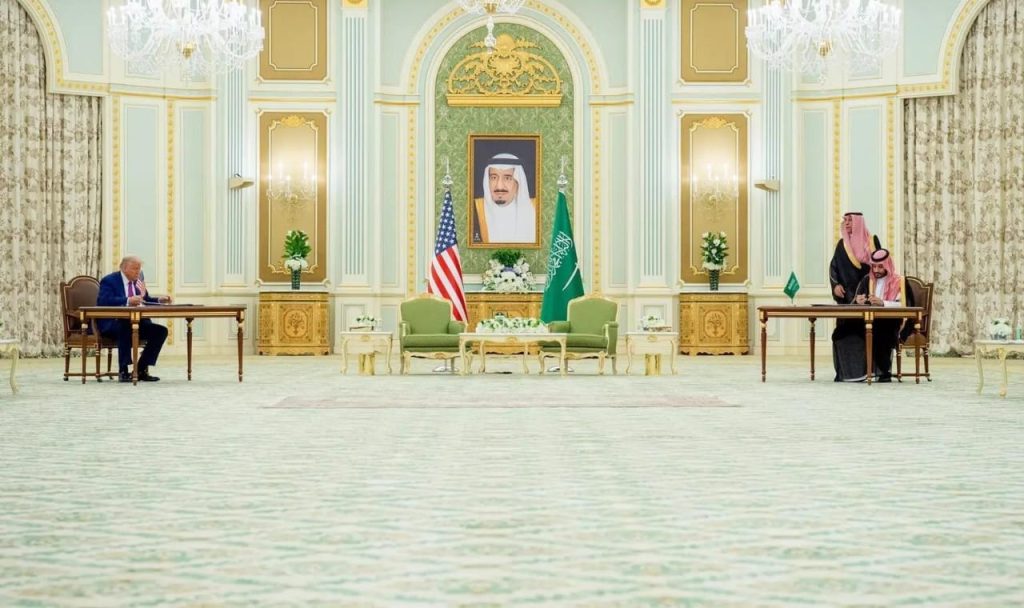
Fiscal alignment & investment surge
Saudi Finance Minister Mohammed Aljadaan and U.S. Treasury Secretary Scott Bessent participated in a panel titled “Striking Balance: Coordinating Fiscal and Monetary Actions,” reaffirming their countries’ commitment to economic collaboration. Aljadaan emphasized the increasing inflow of American investments into Saudi Arabia since the launch of Vision 2030 and praised bilateral efforts to reduce dependence on oil while fostering mutual growth.
Bessent underscored the U.S. government’s efforts to rebalance global trade, particularly through greater access to international markets, and commended the economic momentum created through joint agreements with Saudi Arabia.
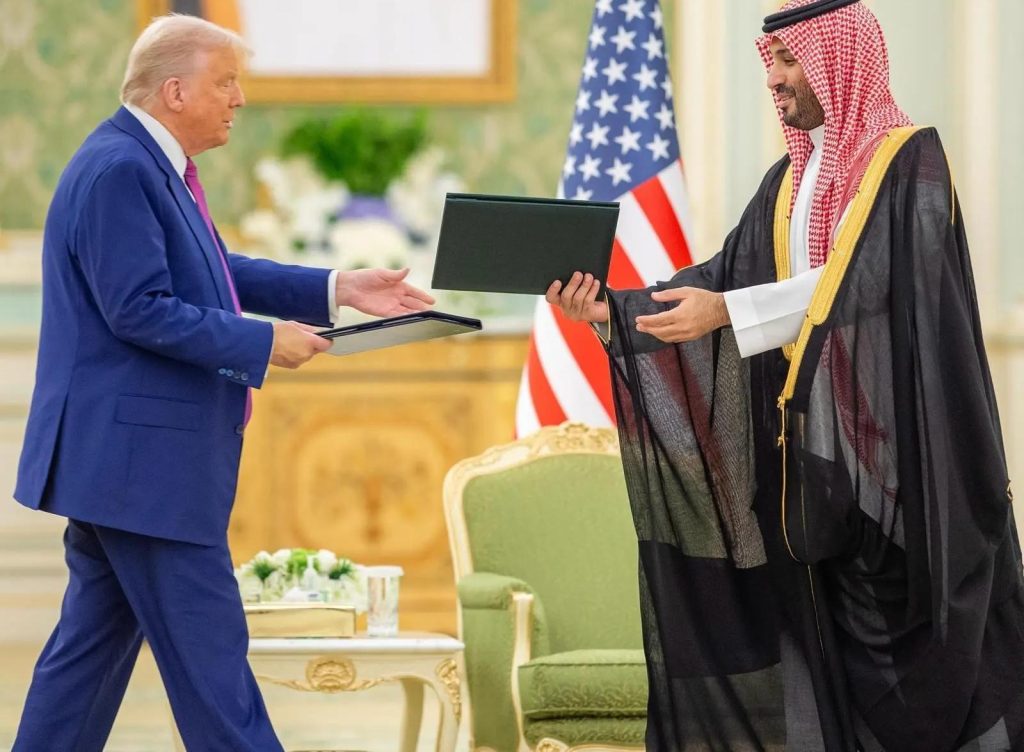
Business Council highlights expanding trade
Saudi-US Business Council CEO Charles Hallab hailed Trump’s visit as a “defining moment” in bilateral relations. He noted that trade between the two countries reached nearly $32 billion in 2024, spanning machinery, vehicles, chemicals, and pharmaceuticals. He also highlighted Saudi investments in strategic U.S. sectors such as clean energy, manufacturing, and technology via the Public Investment Fund (PIF).
Hallab affirmed that Vision 2030 is catalyzing new business opportunities, and he pledged the Council’s continued role in fostering economic dialogue and facilitating mutually beneficial investments.
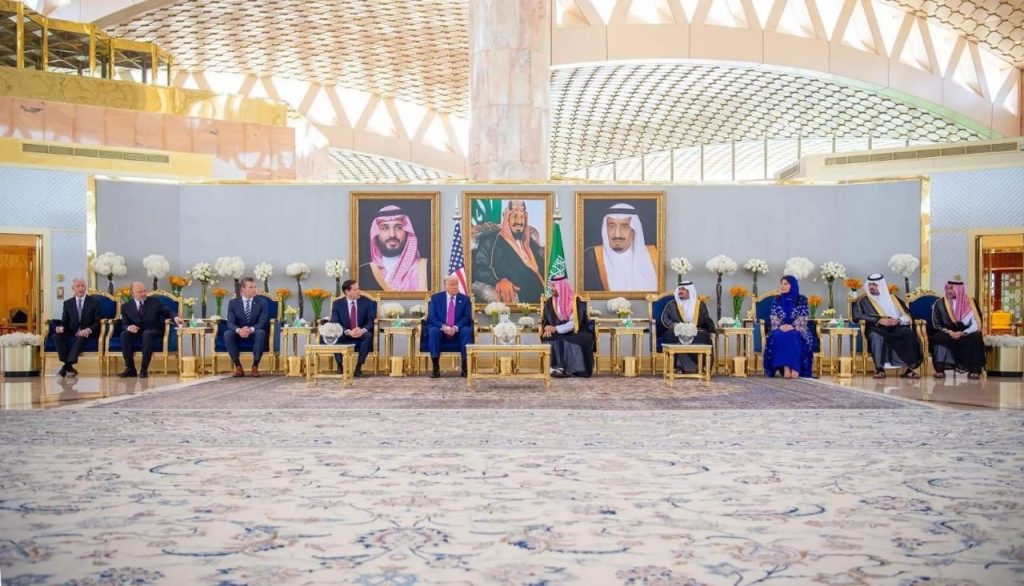
Tech, AI, & Space: A strategic digital alliance
Minister of Communications and Information Technology Abdullah Alswaha spotlighted the Kingdom’s emergence as the region’s leading digital economy. Speaking to media, he revealed that between 2024 and 2025, Saudi Arabia attracted over $13 billion in U.S. tech investments—90% of which were in AI, cloud services, and data centers—through partnerships with industry giants such as AWS, Microsoft, Google Cloud, Oracle, and Groq.
Alswaha credited this momentum to Crown Prince Mohammed bin Salman’s Vision 2030 roadmap, which prioritizes technological innovation and human capital development. He noted that Saudi Arabia now has the region’s largest pool of digital professionals, with over 381,000 trained experts, including a leading number of women in AI.
He also underscored collaboration in the space sector, highlighting the historic participation of the first Saudi woman astronaut in an ISS mission, conducted in cooperation with NASA, SpaceX, and Axiom Space. The signing of the Artemis Accords, he said, signals Saudi Arabia’s commitment to the $2 trillion future global space economy.
Moreover, Alswaha pointed to research partnerships with top U.S. institutions—including MIT, Stanford, and IBM—that have yielded 14 centers of excellence in fields like nanotech, clean energy, and artificial intelligence.
U.S. tech leadership applauds Kingdom’s progress
David Sacks, White House lead on AI and crypto, praised Saudi Arabia’s innovation ecosystem during a dialogue at the Investment Forum. He called the Kingdom a “key partner” in shaping the future of global AI and digital transformation, citing his visit to Riyadh’s innovation incubator “Garage” where he met local startups pioneering robotics, biocomputing, and health-tech solutions.
Sacks highlighted Saudi Arabia’s work in AI-driven genomics and gene therapy as evidence of its capacity to deliver tech-driven development outcomes, especially in public health. He reiterated that U.S.-Saudi cooperation in the tech sector is becoming a global model, blending innovation, investment, and shared strategic vision.
President Trump’s state visit has reinforced the depth and diversity of U.S.-Saudi ties—spanning from traditional diplomacy and trade to futuristic collaboration in AI, space, and digital infrastructure. As both nations look ahead, the visit sets the stage for an expanded strategic partnership grounded in shared values, economic alignment, and mutual innovation.

